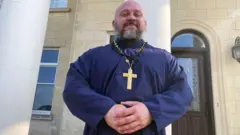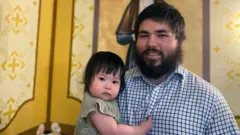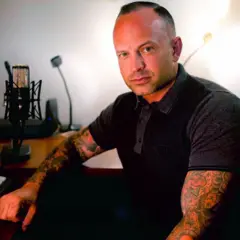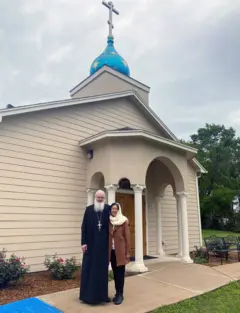
Father Moses McPherson, a Russian Orthodox priest
“A lot of people ask me: ‘Father Moses, how can I increase my manliness to absurd levels?‘”
In a YouTube video, a priest is championing a form of virile, unapologetic masculinity.
Skinny jeans, crossing your legs, using an iron, shaping your eyebrows, and even eating soup are among the things he derides as too feminine.
There are other videos of Father Moses McPherson - a powerfully-built father of five - weightlifting to the sound of heavy metal.
He was raised a Protestant and once worked as a roofer, but now serves as a priest in the Russian Orthodox Church Outside Russia (ROCOR) in Georgetown, Texas, an offshoot of the mother church in Moscow.
ROCOR, a global network with headquarters in New York, has recently been expanding across parts of the US - mainly as a result of people converting from other faiths.
In the last six months, Father Moses has prepared 75 new followers for baptism in his church of the Mother of God, just north of Austin.
“When my wife and I converted 20 years ago we used to call Orthodoxy the best-kept secret, because people just didn’t know what it was,” he says.
“But in the past year-and-a-half our congregation has tripled in size.”

Theodore, pictured holding his child in his arms.
During the Sunday liturgy at Father Moses’s church, I am struck by the number of men in their twenties and thirties praying and crossing themselves at the back of the nave, and how this religion - with traditions dating back to the 4th century AD - seems to attract young men uneasy with life in modern America.
Software engineer Theodore tells me he had a dream job and a wife he adored, but he felt empty inside, as if there was a hole in his heart. He believes society has been “very harsh” on men and is constantly telling them they are in the wrong. He complains that men are criticised for wanting to be the breadwinner and support a stay-at-home wife.
“We are told that’s a very toxic relationship nowadays,” Theodore says. “That’s not how it should be.”
Almost all the converts I meet have opted to home-school their offspring, partly because they believe women should prioritise their families rather than their careers.
Father John Whiteford, an archpriest in the ROCOR from Spring, north of Houston, says home-schooling ensures a religious education and is “a way of protecting your children”, while avoiding any talk about “transgenderism, or the 57 genders of the month or whatever”.
Russia’s Church in Texas
The Americans converting to Orthodox Christianity
Compared to the millions of worshippers in America’s evangelical megachurches, the numbers of Christian Orthodox are tiny - only about one percent of the population. That includes Eastern Orthodoxy, as practised across Russia, Ukraine, eastern Europe and Greece, and the Oriental Orthodox from the Middle East and Africa.
Founded by priests and clergy fleeing the Russian Revolution in 1917, ROCOR is seen by many as the most conservative Orthodox jurisdiction in the US. Yet this small religious community is a vocal one, and what’s unfolding within it mirrors broader political shifts, especially following President Donald Trump’s dramatic pivot toward Moscow.
The true increase in the number of converts is hard to quantify, but data from the Pew Research Centre suggests Orthodox Christians are 64% male, up from 46% in 2007.
A smaller study of 773 converts appears to back the trend. Most recent newcomers are men, and many say the pandemic pushed them to seek a new faith. That survey is from the Orthodox Church in America (OCA), which was established by Russian monks in Alaska in the late 18th Century and now has more than 700 parishes, missions, communities, monasteries, and institutions in the US, Canada and Mexico which identify as Russian Orthodox.
Professor Scott Kenworthy, who studies the history and thought of Eastern Orthodox Christianity - particularly in modern Russia - says his OCA parish in Cincinnati “is absolutely bursting at the seams”.
He’s attended the same church for 24 years and says congregation numbers remained steady until the Covid lockdown. Since then, there has been constant flow of new inquirers and people preparing to be baptised, known as catechumens.
“This is not just a phenomenon of my own parish, or a few places in Texas,” Prof Kenworthy says, “it is definitely something broader.”
The digital space is key in this wave of new converts. Father Moses has a big following online - when he shares a picture of a positive pregnancy test on his Instagram feed he gets 6,000 likes for announcing the arrival of his sixth child.
But there are dozens of other podcasts and videos presented by Orthodox clergy and an army of followers - mainly male.
Father Moses tells his congregation there are two ways of serving God - being a monk or a nun, or getting married. Those who take the second path should avoid contraception and have as many children as possible.
“Show me one saint in the history of the Church who ever blessed any kind of birth control,” Father Moses says. As for masturbation - or what the church calls self-abuse - the priest condemns it as “pathetic and unmanly”.
Father Moses says Orthodoxy is “not masculine, it is just normal”, while “in the West everything has become very feminised”. Some Protestant churches, he believes, mainly cater for women.
“I don’t want to go to services that feel like a Taylor Swift concert,” Father Moses says. “If you look at the language of the ‘worship music’, it’s all emotion - that’s not men.”
Elissa Bjeletich Davis, a former Protestant who now belongs to the Greek Orthodox Church in Austin, is a Sunday school teacher and has her own podcast. She says many converts belong to “the anti-woke crowd” and sometimes have strange ideas about their new faith - especially those in the Russian Church.
“They see it as a military, rigid, disciplinary, masculine, authoritarian religion,” Elissa says. “It’s kind of funny. It’s almost as if the old American Puritans and their craziness is resurfacing.”

Buck Johnson is photographed in front of a microphone, wearing a black short sleeved t-shirt. He has heavily tattooed arms.
Buck Johnson has worked as a firefighter for 25 years and hosts the Counterflow podcast.
He says he was initially scared to enter his local Russian Orthodox Church as he “looks different, covered in tattoos”, but tells me he was welcomed with open arms. He was also impressed the church stayed open throughout the Covid lockdown.
Sitting on a couch in front of two huge TV screens at his home in Lockhart, he says his newfound faith is changing his view of the world.
“Negative American views on Russia are what worry me,” Buck says. He tells me the mainstream, “legacy” media presents a distorted picture of the invasion of Ukraine.
“I think there’s a holdover from the boomer generation here in America that lived through the Cold War,” Buck says, “and I don’t quite grasp why - but they say Russia’s bad.”
The head of the Russian Church in Moscow, Patriarch Kirill, has doggedly backed the invasion of Ukraine, calling it a Holy War, and expressing little compassion for its victims. When I ask Archpriest Father John Whiteford about Russia’s top cleric, who many see as a warmonger, he assures me the Patriarch’s words have been distorted.
Footage and photographs of Putin quoting Bible verses, holding candles during services in Moscow’s Cathedral of Christ the Saviour and stripping down to his swim trunks to plunge into icy water at Epiphany, seem to have struck a chord. Some - in America and other countries - see Russia as the last bastion of true Christianity.

Archpriest John Whiteford, pictured with his wife Patricia, are standing outside St Jonah’s Orthodox church in Spring, Texas. He has a long, white beard and is wearing black robes and a large cross around his neck.
Nearly a decade ago, another Orthodox convert turned priest from Texas, Father Joseph Gleason, moved from America to Borisoglebskiy, a village four hours’ drive north of Moscow, with his wife and eight children.
“Russia does not have homosexual marriage, it does not have civil unions, it is a place where you can home-school your kids and - of course - I love the thousand-year history of Orthodox Christianity here,” he told a Russian video host.
This wispy-bearded Texan is in the vanguard of a movement urging conservatives to relocate to Russia. Last August, Putin introduced fast-track shared values visa for those fleeing Western liberalism.
Back in Texas, Buck tells me he and his fellow converts are turning their backs on instant gratification and American consumerism.
“We’re thinking of things long term,” Buck says, “like traditions, love for your family, love for you community, love for neighbours.
“I think that orthodoxy fits us well - and especially in Texas.”